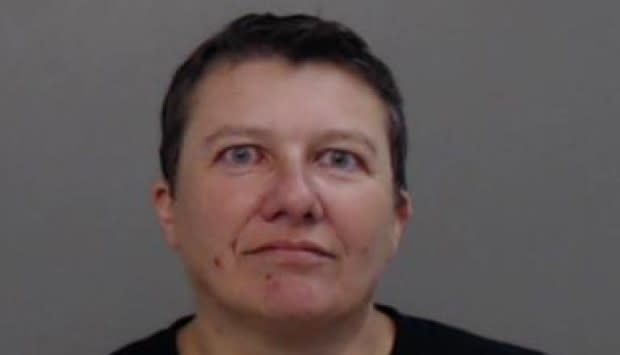Not guilty plea entered on behalf of Canadian arrested in White House ricin case
A U.S. judge has entered a plea of not guilty on behalf of the woman suspected of sending ricin-laced envelopes from Canada to the White House and to several officials in Texas.
Pascale Ferrier, 53, made a brief appearance in a Buffalo, N.Y., courtroom this afternoon after she was arrested over the weekend at the Peace Bridge border crossing between Fort Erie, Ont., and New York State. She faces a charge of threatening the president.
U.S. Magistrate Judge H. Kenneth Schroeder Jr. said since it is a criminal complaint there was no need for her to enter a plea during her brief court appearance today, but he entered a plea of not guilty on her behalf.
The matter was put over until Monday for an identity and probable cause hearing.
Ferrier, who is using a French interpreter in court, will remain in custody until at least Sept. 28, although a representative of the attorney's office said it will ask that she be denied bail given the severity of the charge, and because they feel she's a flight risk.
According to an affidavit from an FBI bomb technician, officials intercepted a letter, addressed to U.S. President Donald Trump and postmarked from Canada, containing a white powdery material around 9 a.m. on Friday at a mail sorting facility. It later tested positive for ricin.
Ricin is found naturally in castor beans and can be turned into a deadly poison. Exposure to an amount as small as a pinhead can be fatal.
According to the FBI, Ferrier wrote in the letter that she has cousins living in the U.S. and didn't want four more years of Trump as president. She allegedly wrote that she had made a "special gift" for him and that if it didn't work, she'd find another poison recipe or use her gun.
A search of social media shows Ferrier was relatively quiet on political issues but recently made some posts critical of Trump.
While the letter addressed to Trump was being sent out for a forensic examination, the intelligence bureau was alerted to six additional letters sent to Texas addresses earlier that week, according to the affidavit written by an FBI special agent bomb technician.
They were addressed to officials connected to the facilities Ferrier had been housed at during a brief stint in detention back in early 2019. Those letters also contained white powder and featured threatening language similar to the letter sent to Trump, says the affidavit.

After looking into people with Canadian ties who had been arrested and incarcerated in the San Antonio area recently, the FBI said it identified Ferrier — a French-born Canadian citizen who has been living in the country since 2008 — as its suspect.
The document said four of the letters sent to San Antonio had latent fingerprints on them which matched Ferrier's prints in the FBI database,
U.S. Customs and Border Protection acting commissioner Mark Morgan said Ferrier stopped her vehicle in the pre-primary area on Sunday, and did not pull forward to report for inspection. When officers went to engage, Ferrier allegedly said she was wanted by the FBI for mailing envelopes with ricin to the White House and other locations.
"Upon a subsequent search, officers discovered a gun, knife and ammunition. CBP officers immediately disarmed Ferrier, secured the weapons, arrested her and coordinated with the FBI for further investigation," said Morgan in a statement issued Tuesday.
"The officers' quick action should be commended, and exemplifies what we do every day on the frontline of our nation's borders."
Ferrier arrested in Texas last year.
One of the Texas-bound letters was addressed to Sheriff J.E. "Eddie" Guerra, according to a news release from the Hidalgo County Sheriff's Office.
Ferrier was arrested in Mission, Texas in March 2019 and accused of illegally carrying a firearm and holding a fake driver's licence, court records show.
Her defence lawyer in the Mission case, Alberto Osorio, said she had purchased the firearm legally, but that the case hinged on whether her trailer was considered a home or vehicle.
She pleaded not guilty and the charge was eventually dismissed because it was her first offence. She spent 20 days in jail and, according to the affidavit, was eventually released into the care of U.S. Immigration and Customs Enforcement.
The sheriff's office said Ferrier was booked into the Hidalgo County Jail by the Mission Police Department.
"The author clearly stated a desire to harm Sheriff Guerra and three female detention officers as they too were sent letters. The letters were intercepted at the Hidalgo County Detention Center, without incident," says the statement sent today.
"The FBI was able to confirm the substance found in all four letters received was ricin, a potentially deadly poison."
"This is a shock, shocking to me," said Osorio of the ricin allegations. "My interactions with Ms. Ferrier were always very pleasant, I must say."
"At the end of the day, I'm glad that nobody got hurt."
On this side of the border, the RCMP has been aiding the FBI's investigation. Mounties, including a team of officers with expertise in handling chemicals and explosives, searched a condominium in Saint-Hubert on Montreal's South Shore on Monday.
Cpl. Charles Poirier, spokesperson for the Quebec division of the RCMP, told reporters there is a link between the residence and the woman suspected of sending the letters, but couldn't confirm whether she lived at the residence.
WATCH | Police search condo linked to Canadian arrested for allegedly sending ricin to White House:


